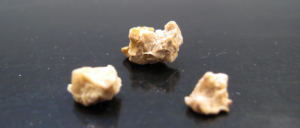
Well, well, well...it was a rocky holiday season. Lots of people got Covid, including myself. It hit everyone I know harder than expected, with symptoms much worse than with a flu virus.
Anyway, while visiting someone in a hospital I happened to be there when dinner was served. I was absolutely shocked that much of the hospital meal contained ultra-processed foods with absolutely garbage ingredients. Artificial colors, high fructose corn syrup (e.g., ginger ale), etc.
This is what sick people are given? Food ingredients linked to gut inflammation and a number of health problems? Perhaps they're making sure they get lots of repeat business.
Vanilla pudding ingredients: Water, nonfat milk, sugar, modified corn starch, palm oil, salt, sodium stearoyl lactylate, disodium phosphate, natural and artificial flavors, yellow 5, yellow 6. (This was dessert.)
 The Lemon Tea ingredients: Water, citric acid, instant tea powder, sodium benzoate, potassium sorbate, caramel color, acesulfame-K, sucralose, natural flavors.
The Lemon Tea ingredients: Water, citric acid, instant tea powder, sodium benzoate, potassium sorbate, caramel color, acesulfame-K, sucralose, natural flavors.









